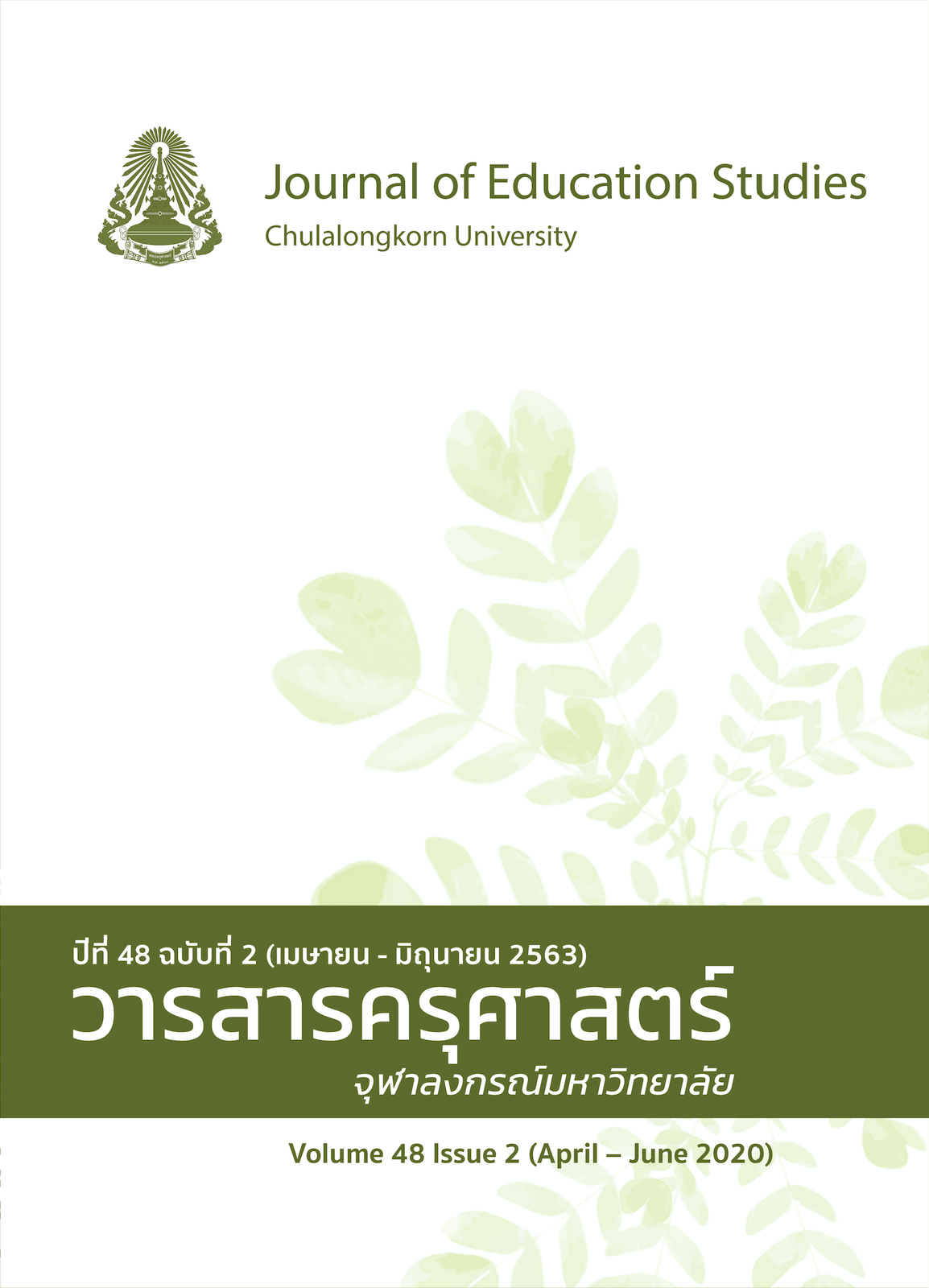Effects of 7E Learning Cycle Model with the STAD Cooperative Learning Technique towards Learning Achievement and Attitude towards Biology of 11th-grade Students
DOI:
https://doi.org/10.14456/educu.2020.49Keywords:
7E learning cycle model, 7E learning cycle model with STAD cooperative learning technique, learning achievement towards biology, attitude towards biologyAbstract
The purpose of this research was to compare learning achievement and attitude towards biology among 11th-grade students using the 7E Learning Cycle Model and 7E Learning Cycle Model with cooperative learning technique, STAD. The samples were 2 classes of 11th-grade students from a school in Chonburi province who were selected using Cluster Random Sampling. The research instruments were a Biology Learning Achievement Test and an Attitude towards Biology Questionnaire. The data were analyzed by 1) comparing the post-test mean scores of Learning Achievement regarding Nervous system and Sensory organs among students in both groups against the 70 percent criterion for success by using one sample t-test, and 2) comparing the post-test mean scores regarding Learning Achievement and Attitude towards Biology among students of both groups by using independent samples t-tests.
The research findings showed that 1) The post-test mean scores of Learning Achievement of students in both groups were higher than the 70 percent criterion at the statistically significant .01 level. 2) The post-test mean scores of Learning Achievement and Attitude towards Biology among students in the class assessed using 7E Learning Cycle Model with cooperative learning technique, STAD, were higher than that of students in the class using 7E Learning Cycle Model at the statistically significant .01 level.
References
ประสาท เนืองเฉลิม. (2550). การเรียนรู้วิทยาศาสตร์แบบสืบเสาะ 7 ขั้น. วารสารวิชาการ, 10(4), 25–30.
พัชรินทร์ ศรีพล. (2556). การศึกษาผลสัมฤทธิ์ทางการเรียนและเจตคติต่อวิชาเคมีของนักเรียนชั้นมัธยมศึกษาปีที่ 4 ที่ได้รับการสอนโดยใช้รูปแบบวัฏจักรการสืบเสาะหาความรู้ 5 ขั้น (5E) ร่วมกับการเรียนแบบร่วมมือเทคนิค STAD [วิทยานิพนธ์การศึกษามหาบัณฑิต ไม่ได้ตีพิมพ์]. มหาวิทยาลัยบูรพา.
มยุรี สาลีวงศ์. (2535). ผลสัมฤทธิ์ทางการเรียนวิชาคณิตศาสตร์ และความภาคภูมิใจในตนเองของนักเรียนชั้นมัธยมศึกษาปีที่ 1 ที่ได้รับการสอนโดยใช้กิจกรรมการเรียนแบบ STAD กับกิจกรรมการเรียนตามคู่มือครูของ สสวท. [วิทยานิพนธ์การศึกษามหาบัณฑิต ไม่ได้ตีพิมพ์]. มหาวิทยาลัยศรีนครินทรวิโรฒ.
รุ่งระวี ศิริบุญนาม. (2551). การเปรียบเทียบความสามารถในการคิดวิเคราะห์ผลสัมฤทธิ์ทางการเรียนกลุ่มสาระการเรียนรู้วิทยาศาสตร์ เรื่อง กรด-เบส และเจตคติต่อการเรียนเคมีของนักเรียนชั้นมัธยมศึกษาปีที่ 5 ที่ได้รับการเรียนรู้แบบวัฏจักรการเรียนรู้ 7 ขั้นการเรียนรู้แบบ KWL และการเรียนรู้แบบปกติ [วิทยานิพนธ์การศึกษามหาบัณฑิต ไม่ได้ตีพิมพ์]. มหาวิทยาลัยมหาสารคาม.
วันวิสาข์ ศรีวิไล. (2556). การสร้างชุดกิจกรรมการเรียนกลุ่มสาระการเรียนรู้วิทยาศาสตร์เรื่องพืช สำหรับนักเรียนชั้นประถมศึกษาปีที่ 4 โดยใช้การสอนแบบผสมผสานระหว่างวัฏจักรการสืบเสาะหาความรู้ 5 ขั้น (5E) กับ การเรียนแบบร่วมมือด้วยเทคนิค STAD [วิทยานิพนธ์การศึกษามหาบัณฑิต ไม่ได้ตีพิมพ์]. มหาวิทยาลัยบูรพา.
สถาบันทดสอบทางการศึกษาแห่งชาติ. (2557). ค่าสถิติพื้นฐานผลการสอบ GAT/PAT.
http://www.niets.or.th/index.php/exam_information/view_se/7
สถาบันส่งเสริมการสอนวิทยาศาสตร์และเทคโนโลยี. (2556). คู่มือครู รายวิชาพื้นฐาน ชีววิทยา สำหรับนักเรียนที่เน้นวิทยาศาสตร์ ชั้นมัธยมศึกษาปีที่ 4-6: กลุ่มสาระการเรียนรู้วิทยาศาสตร์ สำหรับนักเรียนที่เน้นวิทยาศาสตร์ ตามหลักสูตรแกนกลางการศึกษาขั้นพื้นฐาน พุทธศักราช 2551 (พิมพ์ครั้งที่ 5). สถาบันส่งเสริมการสอนวิทยาศาสตร์และเทคโนโลยี.
สมโภชน์ อเนกสุข. (2554). วิธีการทางสถิติสำหรับการวิจัย. ภาควิชาวิจัยและจิตวิทยาประยุกต์ คณะศึกษาศาสตร์ มหาวิทยาลัยบูรพา.
สุพัตรา เนียมสุวรรณ. (2547). การเปรียบเทียบผลสัมฤทธิ์ทางการเรียนและเจตคติต่อวิชาวิทยาศาสตร์ของนักเรียนชั้นมัธยมศึกษาปีที่ 3 ที่ได้รับการสอนโดยใช้การเรียนแบบร่วมมือและการสอนตามปกติ [วิทยานิพนธ์ปริญญามหาบัณฑิต ไม่ได้ตีพิมพ์]. มหาวิทยาลัยราชภัฏนครสวรรค์.
สุวิทย์ มูลคํา และ อรทัย มูลคํา. (2547). 21 วิธีจัดการเรียนรู้เพื่อพัฒนากระบวนการคิด (พิมพ์ครั้งที่ 4). ภาพพิมพ์.
ภาษาอังกฤษ
Eisenkraft, A. (2003). Expanding the 5Es model: A proposed 7E emphasizes: Transferring of learning and the importance of eliciting prior understanding. The Science Teacher, 2(2), 56-59.
Slavin, R. E. (1995). Cooperative learning theory, research and practice (2nd ed.). A Simom & Schuster.
Downloads
Published
How to Cite
Issue
Section
License

This work is licensed under a Creative Commons Attribution-NonCommercial-NoDerivatives 4.0 International License.




